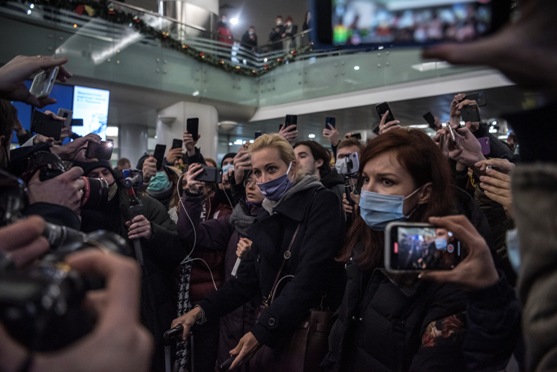Navalny arrested on return to Moscow in battle of wills with Putin

By Anton Troianovski and Ivan Nechepurenko
MOSCOW — Alexei Navalny returned to his home country Sunday (17), five months after a near-fatal nerve-agent attack, and was arrested at the border, a show of fearlessness by Russia’s most prominent opposition leader and of anxiety by President Vladimir Putin.
In hours of livestreamed drama that played out in Berlin, in the air and at two Moscow airports, Navalny careened headlong into near-certain detention after deciding to leave the relative safety of Germany, where he had been recovering from last summer’s poisoning.
Hundreds of people braved the bitter cold outside Moscow’s Vnukovo Airport to greet Navalny, but the low-cost Russian airline he was flying was diverted just before landing to a different Moscow airport. There, at passport control, Navalny was confronted by uniformed policemen in black masks.
He embraced his wife Yulia Navalnaya before being led away.
“I am not afraid,” Navalny told reporters just before he was detained, standing in front of a neon sign at the airport that portrayed the Kremlin. “I know that I am in the right and that all the criminal cases against me are fabricated.”
Navalny’s arrest had been expected, but the day offered some of the most dramatic images of recent years underlining both Russia’s rising domestic discontent and the Kremlin’s jitters over it.
Scores of riot police officers in camouflage uniforms and shiny black helmets swarmed the arrival halls of Vnukovo, detaining dozens. Other officers, some in plainclothes, swooped in on some of Navalny’s top associates as they dined at an airport cafe and led them away.
Russia’s independent media offered nonstop live coverage, freely accessible on Russia’s mostly uncensored internet, from the moment German police officers escorted Navalny to the tarmac in Berlin. Dozhd, an online television channel, reported that its live feed Sunday evening was viewed 6 million times.
Ever mindful of the social-media optics back home, Navalny responded in Russian to questions lobbed at him in English as he stepped on the plane in Berlin. Just before takeoff, he posted a video to Instagram showing his wife delivering a line from a popular Russian crime movie: “Bring us some vodka, boy. We’re flying home.”
His style — tough, populist and humorous all at the same time — are what helped make Navalny, 44, Russia’s best-known opposition leader. An online audience of millions watch for his YouTube videos, which allege widespread corruption in the ruling elite.
But his followers are not the only ones watching.
In August, Navalny was poisoned in Siberia by a military-grade nerve agent, in what he and Western officials say was an assassination attempt by the Russian state.
In December, following up on an investigation by the research group Bellingcat, Navalny pretended to be a Russian official and called a security-service agent he said was part of the unit that tried to kill him, extracting what sounded like a confession.
On Wednesday (13), however, Navalny said he was coming home, despite the threat of arrest. “Russia is my country,” he said. “Moscow is my city. And I miss them.”
The question now is whether Navalny will be jailed for only a few days or weeks — as has happened to him repeatedly in recent years — or for much longer.
Soon after his detention Sunday evening, Russia’s state penitentiary service said Navalny would remain behind bars pending a court hearing for violating the terms of a suspended sentence he initially received in 2014. The sentence grew out of a financial-crime case brought against him and his brother that the European Court of Human Rights later declared unwarranted.
The penitentiary service says that while recuperating in Germany last year, Navalny failed to report to it twice a month, as required by the court. In the days before his trip back home, the service warned that it would have him arrested on those grounds.
Navalny’s fate could depend in part on the intensity of the backlash to his arrest at home and abroad. In Russia, his backers called for protests in the coming days, and noted that his lawyer was not being allowed access to the opposition leader.
“Alexei Navalny has been kidnapped, he is in danger,” a senior adviser to Navalny, Leonid Volkov, posted on Telegram several hours after the arrest. “He is in the hands of people who have already tried to kill him.”
In the United States, Jake Sullivan, the designated national security adviser to President-elect Joe Biden, called for Navalny’s immediate release in a posting on Twitter: “The Kremlin’s attacks on Mr. Navalny are not just a violation of human rights, but an affront to the Russian people who want their voices heard.”
The departing secretary of state, Mike Pompeo, also condemned the arrest. “Alexei Navalny is not the problem,” he said in a statement. “We demand his immediate and unconditional release.”
Putin, who has ruled for 21 years, continues to retain tight control of the television airwaves, domestic politics and a sprawling security apparatus. But his popularity with the Russian public has ebbed in recent years amid stagnant incomes and widespread disgust with official corruption.
Navalny has taken advantage of the discontent, building up a nationwide network of local offices and using social media to highlight the elite’s hidden wealth and the struggles of regular Russians.
Among the supporters hoping to greet him Sunday at Vnukovo Airport was Vladimir Murzin, a 50-year-old legal consultant. Murzin said he and several others had travelled from Tambov — a 300-mile drive — to be there. The opposition leader’s poisoning, he said, had only intensified his “yearslong fury at the unfairness of what is happening in our country under the Putin regime.”
“This is a man whom the masses will follow,” Murzin said of Navalny. “Every citizen who disagrees with the current regime needs each other’s support.”
-New York Times

